High In Heaven, Stoned In Hell: Exploring The Meads Of Asphodel

| Written by: | Auntie Sahar |
| Published: | January 03, 2017 |
If you make a list of some of the most ardent rule breakers and innovators within the international metal community, you damn well better have The Meads Of Asphodel on that list. The band is an enigma, and a highly tantalizing one at that. Black metal, folk, neolassical, electronica, punk, or whatever else they feel like, and wrapped in interesting themes of Biblical and Jewish history, the time has come for an in depth exposé of this curious group.
This article is essentially following in the spirit of our "Getting Into" series, originally begun by Metal Storm's own Baz Anderson, and recently built upon by ScreamingSteelUS as well. Yet as someone who has a background in writing, as well as a strong passion for history, I often find myself both critically analyzing bands' lyrics as well as charting their timelines for myself to keep their current approaches in good context. Therefore, my "Getting Into" approach will be less of a brief overview of each album from the discography of The Meads and more of a history/analysis elaborating upon how I feel they've evolved both musically and thematically with each release. I hope that in doing so, I may offer new perspectives to those already familiar with the band as well as spark interest in the uninitiated to seek out the material of this dynamic, creative, and all around impressive group of artists.
EARLY DAYS: UNIQUENESS IN INFANCY
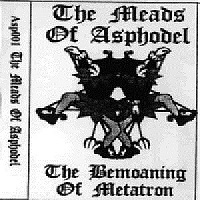
The Meads Of Asphodel emerged in 1998 around Hertfordshire in the United Kingdom. In this initial stage, the band was composed only of its mysterious vocalist and lyricist, Metatron, and an individual known as Jaldaboath, a multi-instrumentalist who handled bass, guitar, drum, and keyboard duty. This duo cranked out three demos together between the years of 1998 and 1999, The Bemoaning Of Metatron, Metatron And The Gleaming Red Serpent, and The Watchers Of Catal Huyuk (all of which have subsequently been collected together on the band's The Early Years compilation).
The sound explored on these demos was nowhere near as grandiose and layered as what would come for the band later. Nor were the lyrics as profound or introspective either, going more in the direction of traditional black metal themes. On the title track of the second demo, for example, Metatron writes, seemingly referring to Satan:
"Guilty of pride, dogs by your side/ Death holds your soul/ Fallen from grace, nowhere to hide/ Diabolis."
While rather basic and stripped down compared to what came later for the band, these demos were nonetheless highly unique at the time for their "Medieval black metal" approach, and they did draw the attention of metal journalists, even the UK's more mainstream Kerrang! Magazine, which gave them positive mentions. Following the acclaim surrounding their final demo, The Meads Of Asphodel then signed to the UK-based Supernal Music Records, and they were ready pump out a debut full length.
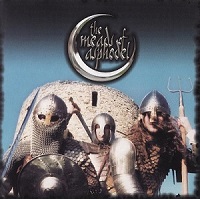
This debut would come in the form of 2001's The Excommunication Of Christ. With the duo of Metatron and Jaldaboath still at the helm, this album can be thought of as something of a refined extension of the band's three demos. It mostly continued in a direction of infusing a core black metal sound with influences from Medieval European folk music, but also dropped a few hints of bigger and better things to come. The Eastern influences present on "Agrat Bat Malah", for example would be further explored and expounded upon greatly in the band's future. The most notable instance of experimentation on this debut, however, is possibly "Bene Ha Elohim", which features the guest appearance of late Hawkwind guitarist Huw Lloyd Langton. The more progressive nature the track dives into midway, as well as the intricate solo that Langton carves, are also techniques that would be further explored by the Meads into their future.
Lyrically speaking, this debut album maintained many of the same dark, semi Satanic themes from the demos, but a new, tongue-in-cheek lampooning of Christian theology had begun to emerge in Metatron's writing as well, and this would prove important down the line. The following from "Following With Lightning Rays..." is particularly amusing:
"Believe in angels or burn in Hell/ Does Satan fuck? No one can tell/ I'm smoking poison by a big oak tree/ And a big black snake came down to me/ Get your axe and cut it down/ And God won't come next time around."
It seems, however, that at this stage this mocking took the form of being present more for the sake of humor than for actual critique. The latter would become more noticeable later.
THE TRANSITION PERIOD: J.D. TAIT AND A MATURATION OF SOUND
The following year, Jaldaboath, who up to that point had essentially been responsible for the musical aspect of The Meads Of Asphodel left, amidst dubious circumstances. There have been allegations that there was a disagreement between him and Metatron over which direction to take the band in going into the future. Jaldaboath apparently wanted to do more of the tongue-in-cheek, humorous, "Medieval black metal" sort of style that they had been doing up to that point, and Metatron wanted something a bit more... sophisticated, perhaps. Additionally, the 2002 Jihad/Freezing Moon split between the Meads and Mayhem was released by Jaldaboath's D.T.M. Productions label without the permission of either band, and to this day both they and the Meads regard it as a bootleg. Whatever the case, in 2002 Jaldaboath departed. His exit, however, would prove to be a blessing in disguise.
In Jaldaboath's wake came the incredibly talented James David ("J.D.") Tait, to fill in the vacant guitarist position. While other musicians were occasionally added on positions such as drums and bass, this new incarnation of the band was now centered around the core of Tait And Metatron, as it had been centered around Jaldaboath and Metatron previously. Tait's highly idiosyncratic style, and his penchant for blending an enormous amount of non-metal influences into his playing, would prove to be incredibly important for the future development of The Meads Of Asphodel's sound. I personally consider him to be one of the most underrated guitarists in the entire spectrum of metal, and, put simply, it is impossible to imagine the band at present without him.
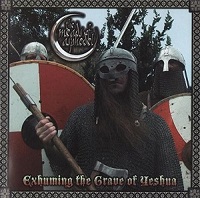
With Tait now at the helm, The Meads Of Asphodel released their sophomore album in 2003, Exhuming The Grave Of Yeshua. Though still rooted mostly in black metal, it was becoming evident that many other influences were now being incorporated into that sound, and the band began distancing itself considerably from the "Medieval black metal" approach that had defined their demos and the debut. Influenced by Tait's peculiar songwriting, the music now began to twist and turn in many different directions, sometimes getting a bit doomy ("Blood Blasted Holy War), at times resembling an almost psychedelic sort of jamming ("Guts For Sale"), and even getting in on a bizarre, electronic form of folk music ("On Graven Images..."). Throughout all these radically different ups and downs in style transition, however, J.D. Tait's guitar playing remained tight, sharp, and on point, and for this, he is definitely to be applauded.
Thematically as well, the Meads were also beginning to tighten their lyrics through Metatron, whose delivery was becoming sharper, wittier, and more ironic in his criticism of not only Christianity, but indeed, Abrahamic religion in general. This can especially be seen on his spoken word contribution to "On Graven Images..." on Exhuming, describing Armageddon:
"On gathering at your place of worship, pray to your sovereign lord/ Salvation is at hand/ If you have sinned, confess/ Confess or be cast into the pit of torment until the Day of Judgment/ But do not panic, God is with you/ God is fucking with you/ God is fucking with you..."
Additionally, Metatron was also displaying a growing tendency around this period towards drawing parallels between ancient and modern religious history with his lyrical critique, a technique that would become essential in the next step that the band would take. Take the title track from the Jihad split with Mayhem for example, which references 9/11 while subtly mocking Quran verses
"The towers of Babel fell as one/ Flesh and stone explode/ The debris of Eden for all to gloat/ God's paradise unveiled/ Thou shalt not kill or maim/ Unless God doth decree/ Thou shalt then do the same/ And kill humanity"
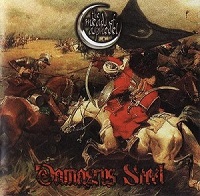
The combination of J.D. Tait's bizarre, genre blending songwriting and Metatron's increasingly clever lyricism would bear farther fruit with the third Meads full length, 2005's Damascus Steel, which can very much be seen as something of a crossroads between the band's earlier material and their more recent efforts of the past 6 years or so. Here Metatron's ironic, tongue-in-cheek attitude is perhaps more noticeable than ever before, especially on the opening track, "Psalm 666", which intersperses a reading of Psalm 23 with soundbites from George W. Bush about the Iraq War. Musically, this album largely follows in the vein of Exhuming, but it also sees a much greater presence of Middle Eastern folk elements, mostly on "Hollow Womb Of Suicide" and the massive "Behold The Kindred Battle Carcasses," easily one of the strongest outputs from the band.
A WATERSHED MOMENT: THE MURDER OF JESUS THE JEW
With the further refining of the Exhuming sound that had come with Damascus Steel, as well as a greater sense of production to boot, The Meads Of Asphodel were ready for yet another major step forward in their evolution. This came not so much from a musical perspective as much as it did from a lyrical one. Metatron was now becoming more interested in concocting Meads albums revolving around a single, cohesive theme, and in generating his own well researched and well written analyses to go with these albums as a pleasant, insightful supplement, in the form of codices. Of course, if one looks to the lyrics of the first three Meads albums, and perhaps even the demos, with a big enough magnifying glass, one can find some sort of unifying theme and common message throughout Metatron's writing. Yet this message could be and often was scattered in various deliveries throughout different tracks, and somewhat lacked a single core spine to really attach itself to for a more direct delivery. This would change with the fourth full length from The Meads Of Asphodel, 2010's The Murder Of Jesus The Jew. Many fans regard it as the band's best album, and not without good reason.
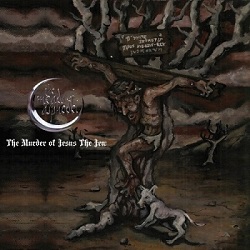
The Murder Of Jesus The Jew is, put simply, a concept album about the life of Christ. But more specifically, it is an attempt from Metatron to separate man from myth, somewhat like Martin Scorsese's The Last Temptation Of Christ, an effort to shed the religious layers off of Jesus and investigate who he really may have been as a person. Metatron suggests in his codex for the album that the investigation into the story of Jesus may have been spurred on by a desire to go deeper into black metal inspiration, saying that "as part of a black metal based band the blaspheming against the Christian movement and rejoicing of all things Satanic are all part and parcel of the theater of the genre. Some bands take it more seriously than others. The story of Jesus is therefore the most important part of this whole Black Metal puzzle. Without him the Christian movement would not exist and Satan would still be a little known word in the Hebrew language."
The greater level of sophistication for this period of The Meads Of Asphodel would be seen in both lyrics and music, and with The Murder Of Jesus The Jew, the music of the band began to reflect a narrative set by the lyrics more so than ever. The album took on an almost opera-like feeling, with different musical "movements" of various moods and techniques twisting all around each other according to the narrative set by the lyrics. On "My Psychotic Sand Deity," for example, describing the anger and fury of the Hebrew God, riffs pack a real punch, tempo is significantly faster than usual, and the music takes an overall more aggressive approach. The same can be seen with the almost punk-like delivery on "Man From Kerioth" (about Judas). On the other hand, tracks like "Stiller Of Tempests" (Jesus questioning the limits of his own powers), or "Apocalypse Of Lazarus," take a more lighthearted, almost danceable approach. Variations in the mood of the music abound as the tone of Metatron's lyrics shifts and sways, and though the Meads had displayed a commendable ability to do this previously, the delivery really seemed to come to a full peak with The Murder Of Jesus The Jew.
The lyrics on this album, as mentioned above, can be seen as walking a delicate (though effective) line between exploring Jesus as myth and Jesus as human, with the man both describing his love for God and his abilities, but also questioning the limits of that love and those abilities, in a very, brutally realist way that allows self doubt into the portrait of a figure typically seen as free of imperfections in Christian belief. This can be seen especially on "Addicted To God":
"Who is God? I am God. Are you God? But what God? / I know God. It's my God. Where is God? Why is God?/ A man god, a fish god, a black god, a white god/ A gay god, a sad god, a blind god, a dead god/ I raise the dead, who said so?/ I heal the sick, why do so?"
A PEAK OF AMBITON? ONWARDS TO SONDERKOMMANDO
The proverbial "next step" for The Meads Of Asphodel following The Murder Of Jesus The Jew would essentially be to capitalize on the approach taken on that album, pushing the topic of Judaeo-Christian history further as well as the boundaries of the band's musical experimentation. The result of such efforts would spawn 2013's Sonderkommando. While The Murder Of Jesus The Jew is often considered the best from the Meads, I personally regard Sonderkommando as such, as it is probably the band's most creative and cohesive output to date.

The Sonderkommando, for those unfamiliar with the term, were Jewish prisoners in concentration camps during the Holocaust that the Nazis offered a gruesome deal: help us work the gas chambers, pull teeth, etc. to your fellow Jews, and we'll put your death on hold. Who knows? We could possibly even spare you. Lyrically, Sonderkommando is about exploring the deep, dark roots of human hatred and racism, and the extreme feelings of self loathing and inferiority that can result from both to the point that the Sonderkommando would have even considered selling out their fellow Jews as they did. It is, as Metatron succinctly put it in an interview, about "the inhumanity of humanity."
Metatron was playing a bit of a dangerous game with this album theme, and he has acknowledged this on multiple occasions, the fact that the topic of Sonderkommando could bring accusations of NSBM (National Socialist Black Metal) against the Meads. But proudly sticking to his guns and defending his lyrics as no more than sincere inquiry and honest portrayal of history, Metatron has held strong against such accusations. It is also testament to his passion and devotion to his studies and lyrical subjects that he actually visited the Auschwitz-Birkenau State Museum during the writing of Sonderkommando, and allegedly wrote a portion of the album's lyrics while there.
Lyrically, Sonderkommando does much of what The Murder Of Jesus The Jew did, walking that delicate balance, this time by portraying the Holocaust not necessarily in terms of an "OH MY GOD, HOW COULD THIS EVER HAPPEN?!" type sob-fest, but also not stopping short of portraying the grim realities of the genocide either. "Wishing Well Of Bones," for example, is quite upbeat, with a main melody that is almost danceable and hummable, and the same can be said of "Silent Ghosts Of Babi Yar." On the other hand, the opening conversation on "Lamenting Weaver Of Horror," intended to be a conversation between a Nazi general and a young Jewish prisoner, takes a much bleaker, more terrifying approach. And closer "Send My Love To Maher-Shalal-Hash-Baz," a spoken word number with Metatron reciting statistics on the number of those killed in the Holocaust, is simply bone chilling. I think the lesson to take away here is that with gruesome events in human history, one should not diminish the reality of what transpired, but that it's also possible to find a bit of dark humor in the complete ridiculousness and barbarity of the events as well, as something of a coping mechanism.
On the musical front, Sonderkommando saw the music of the Meads becoming much more out of the box and multifaceted than perhaps ever before, taking more of an open-ended "Avantgarde metal" approach than merely an "experimental black metal" approach. The title track is perhaps the best example, with its Hitler speech introduction coupled with violin work and gorgeous clean vocals, descending from there into a more blitzkrieg approach, assisted by the commendable drum work of André Kjelbergvik Thung, who joined the band in 2012. But as always, many more moods and variations can be found, such as the techno-like approach on "Lamenting Weaver Of Horror," the insanely good organ employed on "Children Of The Sunwheel Banner," the glorious harmonica on "The Mussulmans....," and much, much more. Lyrically and musically, I would say Sonderkommando truly is the most ambitious Meads album to date.
INTO THE FUTURE
What's next for The Meads Of Asphodel post-Sonderkommando? The band has been relatively quiet since 2013, dropping only a split with The Wolves Of Avalon (a Metatron side band) and another with Tjolgtjar, an American experimental BM one manner. The latter, Taste The Divine Wrath was actually quite interesting, as it saw the Meads pumping out some tracks more akin to the raw, lighthearted playfulness of their early material... not necessarily as sophisticated or "deep" as stuff on The Murder Of Jesus The Jew or Sonderkommando, but still quite fun and enjoyable, especially the bastardized cover of Florence And The Machine's "You've Got The Love" ("Sometimes I feel like throwing grenades up in the air....").
According to social media posts on both The Meads' Facebook page as well as that for Godreah Records, the band's label that J.D. Tait runs, a new Meads Of Asphodel album should be coming relatively soon. And if an interview I did with Metatron in 2015 is anything to go by, lyrically this upcoming one may be tackling the controversial topic of the Israel/Palestine conflict, which I am most definitely looking forward to. If Metatron goes at it with the same sort of objective, brutally honest portrayal that he did with Sonderkommando, and the music follows suit with its trademark quirkiness, I'm more than certain it'll be one hell of a ride.
Why do I love The Meads Of Asphodel so goddamn much? Why should you check them out if you haven't yet, or revisit them if you did previously and didn't care much for them? I think it's really just because few bands capture such a high level of honesty and accuracy with their lyrics, while also combining so many disparate styles into a singular, cohesive whole without being too messy or allowing the train to fly straight off the tracks. My enjoyment of the band is without question owed at least in part to me being a shameless nerd for any and all things history, but I would also like to think that even those not too into history can appreciate the work, time, and boundless passion Metatron puts into crafting his lyrics and the thematic concepts behind Meads albums. My love of the music also probably reflects an early upbringing on jazz and the subsequent love for crazy, multidimensional music I came to have as a result, but similarly, I would like to think that anyone who admires high level songwriting could come to appreciate the subtle complexities and layers of the music of The Meads Of Asphodel.
Call me a fanboy for this band, but it's a badge I've worn proudly and will continue to wear for as long as they remain in existence. I can only hope that with this article, and peeling back the veil on the mysteries of their lyrical and musical depth, I've encouraged some people to investigate the band who otherwise may not have considered doing so.
SUPPLEMENTAL MATERIALS
If you are interested in digging deeper with The Meads Of Asphodel, you may want to check out...
1. The Murder Of Jesus The Jew and Sonderkommando Codices: Massive in depth essays written by Metatron explaining the concepts and inspiration behind the lyrics for these two albums in an amazing level of detail.
2. The Meads Of Asphodel - Life In The Shadows: An excellent, three part documentary on the band put out around the time of recordings for The Murder Of Jesus The Jew. Goes deeply into the history of the band and their lyrical and musical inspirations.
3. The Meads Of Asphodel - A Glimpse Into The Sonderkommando: Another, briefer documentary released around the time of recordings for Sonderkommando, that serves much of the same purpose.
4. The Meads Of Asphodel Bandcamp: Most releases are up on here. Some are missing, but those absent ones can probably be found elsewhere via a quick Google search.
5. The Meads Of Asphodel - Metatron Interview: An excellent, thoroughly intriguing interview with Metatron, conducted by yours truly. He's heard it about a billion times already, but I extend my thanks to him once again for taking the time out for it.
I hope you all enjoyed this one. Forever we shall remain... high in Heaven, stoned in Hell.

Comments
Comments: 17
Visited by: 84 users
| Baz Anderson Staff |
| Auntie Sahar Drone Empress |
| Rot Teufel |
| InnerSelf proofread free |
| Auntie Sahar Drone Empress |
| Auntie Sahar Drone Empress |
| Rot Teufel |
| Chainer Witch Hunter Gen |
| Auntie Sahar Drone Empress |
| ScreamingSteelUS Editor-in-Chief Admin |
| Auntie Sahar Drone Empress |
| Maratha |
| Auntie Sahar Drone Empress |
| RaduP CertifiedHipster Staff |
| Auntie Sahar Drone Empress |
| Starvynth i c deaf people Staff |
| Auntie Sahar Drone Empress |
Hits total: 5915 | This month: 19








